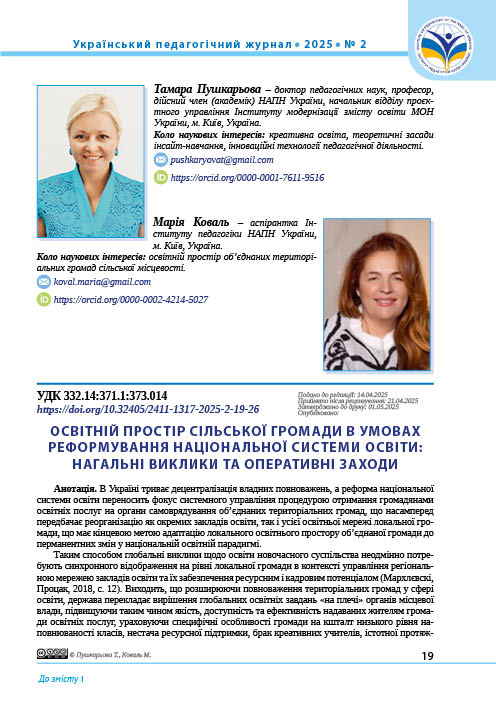Abstract
The ongoing decentralization of governmental powers in Ukraine and the implementation of reforms in the national education system are shifting the focus of systemic management of educational service provision to the local self-government bodies of united territorial communities. This primarily entails the reorganization of both individual educational institutions and the entire educational network of the local community. The ultimate goal is to adapt the local educational space of the united community to the continuous changes in the national educational paradigm.
In this way, global challenges facing education in modern society inevitably require synchronized responses at the local community level—particularly in the context of managing regional educational networks and providing them with adequate resources and staffing. As a result, by expanding the powers of territorial communities in the field of education, the state effectively delegates the resolution of global educational issues to local authorities. This shift aims to improve the quality, accessibility, and efficiency of educational services provided to community residents, taking into account the specific characteristics of rural communities—such as low student enrollment, lack of resource support, shortage of creative teachers, significant geographical spread, and multiethnic composition of the population.
These outlined challenges necessitate operational solutions regarding: improving the quality of public educational services provided to rural community residents, and/or reorganizing inefficient educational networks within rural communities. Recognizing the current challenges in the process of modernizing the educational space of rural united territorial communities—and the urgent need to find operational solutions for adapting these communities' educational environments to changes in educational standards and regulations—it becomes essential to develop recommendations for optimizing the structural framework of rural educational networks and to design strategies for the development of individual educational institutions, particularly in terms of their material and technical support.
References
Денисенко, В. (2022). Освітній простір громади: виклики та перспективи. Novograd City. https://novograd.city/articles/189767/osvitnij-prostir-gromadi .
Касярум, Н.В. (2008). Освітній простір як характеристика сучасної системи освіти. Педагогічна наука: історія, теорія, практика, тенденції розвитку, 1, 1‒3. https://intellect-invest.org.ua/pedagog_editions_n1_2008 .
Касярум, Н.В. (2013). Освітній простір: становлення поняття. Витоки педагогічної майстерності, 12, 107‒113. https://dspace.pnpu.ua/1/Kasjarum.pdf.
Клокар, Н.І. (2017). Освіта в ОТГ: нові підходи до управління в умовах децентралізації влади. Рідна школа, 11, 27‒31. https://lib.iitta.gov.ua/id/eprint/717708/1.pdf .
Мархдєвскі, В., Процак, О. (2018). Стратегія розвитку освіти в громаді. Київ.
Матійчик, Т., Пуцова, А., Руда, О. та ін. (2019). Критерії формування спроможної освітньої мережі в ОТГ [Методичний посібник]. https://decentralization.gov.ua/uploads/library/file/461/1.pdf.
Міністерство регіонально розвитку, будівництва та житлово-комунального господарства України. (2019). Новий освітній простір: Інформаційний посібник. https://decentralization.ua/NOP_Motivuyuchiy-prostir.pdf
Закон України «Про повну загальну середню освіту» від 16 січня 2020 р. № 463-ІХ. (2020). Відомості Верховної Ради України, 31, 226.
Савченко, Ю.А. (2018). Сучасний стан децентралізації в Україні: Секторальний аспект. Науковий вісник Ужгородського національного університету, 19, 172‒175.
Скопненко, О.І., Цимбалюк, Т.В. (уклад.). (2006). Сучасний словник іншомовних слів. Київ: Довіра.
Управління системою освіти територіальних громад: досвід для України. (2018). Вінниця: ТОВ «Твори».
Denysenko, V. (2022). Osvitnii prostir hromady: vyklyky ta perspektyvy. Novograd City. https://novograd.city/articles/189767/osvitnij-prostir-gromadi (in Ukrainian).
Kasiarum, N.V. (2008). Osvitnii prostir yak kharakterystyka suchasnoi systemy osvity. Pedahohichna nauka: istoriia, teoriia, praktyka, tendentsii rozvytku, 1, 1‒3. https://intellect-invest.org.ua/pedagog_editions_n1_2008 (in Ukrainian).
Kasiarum, N.V. (2013). Osvitnii prostir: stanovlennia poniattia. Vytoky pedahohichnoi maisternosti, 12, 107‒113. https://dspace.pnpu.ua/1/Kasjarum.pdf (in Ukrainian).
Klokar, N.I. (2017). Osvita v OTH: novi pidkhody do upravlinnia v umovakh detsentralizatsii vlady. Ridna shkola, 11, 27‒31. https://lib.iitta.gov.ua/id/eprint/717708/1.pdf (in Ukrainian).
Markhdievski, V., Protsak, O. (2018). Stratehiia rozvytku osvity v hromadi. Kyiv. (in Ukrainian).
Matiichyk, T., Putsova, A., Ruda, O. at al. (2019). Kryterii formuvannia spromozhnoi osvitnoi merezhi v OTH [Metodychnyi posibnyk]. https://decentralization.gov.ua/uploads/library/file/461/1.pdf (in Ukrainian).
Ministerstvo rehionalno rozvytku, budivnytstva ta zhytlovo-komunalnoho hospodarstva Ukrainy. (2019). Novyi osvitnii prostir: Informatsiinyi posibnyk. https://decentralization.ua/NOP_Motivuyuchiy-prostir.pdf (in Ukrainian).
Zakon Ukrainy «Pro povnu zahalnu seredniu osvitu» vid 16.01.2020 No. 463-IKh. (2020). Vidomosti Verkhovnoi Rady, 31, 226. (in Ukrainian).
Savchenko, Yu.A. (2018). Suchasnyi stan detsentralizatsii v Ukraini: Sektoralnyi aspekt. Naukovyi visnyk Uzhhorodskoho natsionalnoho universytetu, 19, 172‒175. (in Ukrainian).
Skopnenko, O.I., Tsymbaliuk, T.V. (uklad.). (2006). Suchasnyi slovnyk inshomovnykh sliv. Kyiv: Dovira. (in Ukrainian).
Upravlinnia systemoiu osvity terytorialnykh hromad: dosvid dlia Ukrainy. (2018). Vinnytsia: TOV «Tvory». (in Ukrainian).

This work is licensed under a Creative Commons Attribution-NonCommercial-ShareAlike 4.0 International License.


